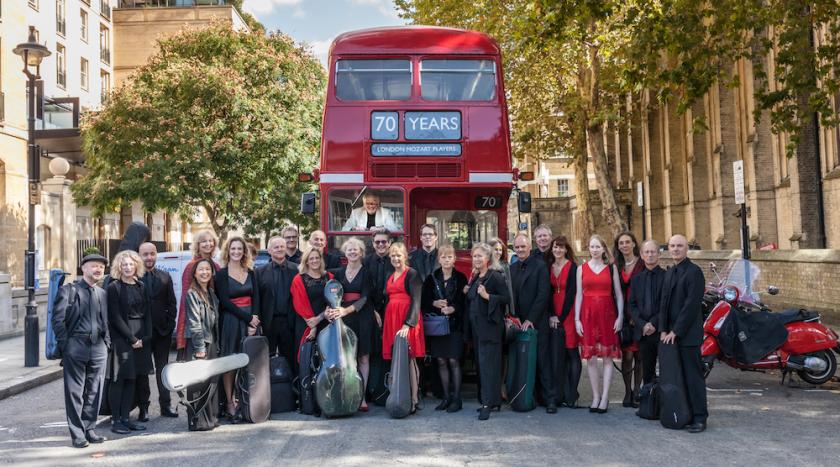The festival Summer Music in City Churches is in only its second year, filling a gap left by the demise of the long-running City of London Festival. This year’s festival had the theme of Words and Music and offered an enticing programme of recitals, talks and walks, focusing on English music through the ages, and finding enterprising ways of combining solo performers with resident ensembles the London Mozart Players and the City of London Choir. The closing concert showcased works inspired by Shakespeare plays, presenting them alongside Shakespeare’s words, spoken by actor Tama Matheson.
The orchestra were on fine form in the opener, William Walton’s suite from Henry V, described by (the not disinterested) Laurence Olivier as “the most wonderful score I’ve ever heard for a film”. Matheson, dressed in tweed jacket and a union jack t-shirt, declaimed the St Crispin’s Day speech from the pulpit, leading into the fabulous overture, trumpets blazing. The slower central movements featured the strings, conductor Hilary Davan Wetton taking “Touch her soft lips and part” at a no-nonsense tempo, avoiding any threat of sentimentality, but allowing the triple-time pulse to breathe. The “Agincourt Song” gave the choir its opportunity: first the men, then everyone intoning Walton’s stirring patriotic hymn. It sounded wonderful – literally spine-tingling – in the big church acoustic.
Gerald Finzi’s music for Love’s Labours Lost is exquisite but rarely performed. The overture has a terrific tune, Elgarian in both tone and calibre. Leader Ruth Rogers here played the first of several excellent solos through the evening. “Soliloquy I” had enough moments of astringency to avert cosiness, and the rhythmically intricate “Finale” offered lively playing from the woodwind.
 Vaughan Williams’ Sereade to Music, heard in its version for choir and four soloists, was touching, the choir providing a bed of sound over which the solos could float. Soprano Rebecca Bottone was excellent in the high register, and tenor Aaron Godfrey-Hayes shone in his brief moment. But perhaps the pick was mezzo Maya Colwell (pictured left by Hope Lavelle), whose big, rich sound was gorgeous: she is one to watch.
Vaughan Williams’ Sereade to Music, heard in its version for choir and four soloists, was touching, the choir providing a bed of sound over which the solos could float. Soprano Rebecca Bottone was excellent in the high register, and tenor Aaron Godfrey-Hayes shone in his brief moment. But perhaps the pick was mezzo Maya Colwell (pictured left by Hope Lavelle), whose big, rich sound was gorgeous: she is one to watch.
Where the three pieces of the first half were all written in Britain within a few years of each other in the mid-20th century, the second half dived back to the 19th for Mendelssohn’s complete incidental music to A Midsummer Night’s Dream. This was presented with a linking monologue, written and spoken by Tama Matheson, that told the story of the play, interspersed with verbatim extracts. Matheson’s narration was in cod-Shakespearean couplets, replete with modern references, that called to mind Roald Dahl’s Revolting Rhymes or Ogden Nash’s version of Carnival of the Animals. It was at times a bit de trop – describing the lovers’ misunderstanding as “hashtag: abuse” was a bit, well, “awks” – but there were some clever rhymes: “Helena” with “put a spell on her” or “Hermia” with “hypothermia”. The decision to narrate the entire play, in all its intricate silliness, stretched the second half to an overlong 80 minutes but Matheson was an engaging personality, and his Shakespeare speaking really very good.
The music itself is, of course, extraordinary. The overture, written when Mendelssohn was 17, is miraculous, and the orchestra’s skittering strings and nimble woodwind drove it forward. Davan Wetton kept his players on a tight rein but found a real energy and sense of fun. Also amazing is that Mendelssohn could pick up his thread several years later and add the rest of the incidental music in the same vein. The “Scherzo” was sprightly, not to say spritely, the “Lullaby” irresistible and the “Finale” magically works its way back to the opening music of the overture for the final words of the play.














Add comment